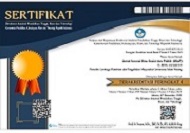Evaluation of the village development index as an effort to provide the right policy intervention
Keywords:
Program Evaluation, Qualitative, Developing Village IndexAbstract
The change in the paradigm of village development from "building villages" to "developing village" forced the village government to provide the right policies so that the expected development could be realized. However, the data that has so far been associated with the developing village index is quantitative and tends to be stagnant. This study aims to evaluate the village development index qualitatively. By using a comparative program after only evaluation approach and a qualitative descriptive research method that emphasizes how the community and village government interpret the programs that have been given before. The results of the study show different findings from the quantitative approach, especially on the Economic Resilience index, which seems to be no different from other villages in general in Indonesia. Even though it has the ideal potential to become an independent village. The recommendations resulting from this research are that it is necessary to maximize Access to Financial Institutions and Trade Service Centers so that their potential can be developed towards an independent village.
References
Abror, M. (2020). Moderasi Beragama dalam Bingkai Toleransi: Kajian Islam dan Keberagaman. Rusydiah Jurnal Pemikiran Islam, 1(2), 143–155. https://doi.org/10.35961/rsd.v1i2.174
Adhinata, B., Darma, I. K., & Siramiati, N. W. (2020). Good Village Governance in Financial Management to Create Independent Village: Study of Pecatu Village Government. SOSHUM : Jurnal Sosial Dan Humaniora, 10(3), 334–344. https://doi.org/10.31940/soshum.v10i3.2015
Afrianti, A., Surya, B., & Aksa, K. (2021). Peningkatan Kualitas Permukiman Suku Bajo Desa Popisi Kecamatan Bangggai Utara Kabupaten Banggai Laut: Studi Penangan Permukiman Masyarakat Suku Wajo. Journal of Urban Planning Studies, 1(2), 140–146. https://doi.org/10.35965/jups.v1i2.32
Andari, R. N., & Ella, S. (2021). Model Desa Cerdas Untuk Membangun Indonesia Maju. Syiah Kuala University Press.
Arifin, B., Wicaksono, E., Tenrini, R. H., Wardhana, I. W., Setiawan, H., Damayanty, S. A., Solikin, A., Suhendra, M., Saputra, A. H., Ariutama, G. A., Djunedi, P., Rahman, A. B., & Handoko, R. (2020). Village fund, village-owned-enterprises, and employment: Evidence from Indonesia. Journal of Rural Studies, 79, 382–394. https://doi.org/10.1016/j.jrurstud.2020.08.052
Astuti, S. J. W., & Suaedi, F. (2021). Building Independent Villages through Collaborative Governance by Village-Owned Enterprises (Best Practice from Panggungharjo Village, Central Java, Indonesia). Journal Ilmu Sosial, Politik Dan Pemerintahan, 7(2), 1–15. https://doi.org/10.37304/jispar.v7i2.962
Bengtsson-Palme, J., Kristiansson, E., & Larsson, D. G. J. (2018). Environmental factors influencing the development and spread of antibiotic resistance. FEMS Microbiology Reviews, 42(1). https://doi.org/10.1093/femsre/fux053
Bradshaw, T. K. (2007). Theories of poverty and anti-poverty programs in community development. Community Development, 38(1), 7–25. https://doi.org/10.1080/15575330709490182
Candra, F. U. (2021). Eksistensi Badan Usaha Milik Desa (BUMDES) Tunggul Ulung Sebagai Sarana Penguat Ekonomi Desa: Study di Desa Tunggul, Kecamatan Paciran Kabupaten lamongan. Jurnal Inovasi Penelitian, 1(9), 2019–2024. https://doi.org/10.47492/jip.v1i9.396
Fatimah, P. L. R. (2019). Mengembangkan Kualitas Usaha Milik Desa (Q-BUMDes) untuk Melestarikan Ketahanan Ekonomi Masyarakat dan Kesejahteraan Adaptif: Perancangan Sistem Kewirausahaan Desa dengan Menggunakan Model Tetrapreneur. Jurnal Studi Pemuda, 7(2), 122–132. https://doi.org/10.22146/studipemudaugm.39551
Huang, R., Liu, D., Tlili, A., Knyazeva, S., Chang, T. W., Zhang, X., Burgos, D., Jemni, M., Zhang, M., Zhuang, R., & Holotescu, C. (2020). Guidance on open educational practices during school closures: Utilizing OER under COVID-19 pandemic in line with UNESCO OER recommendation. Beijing: Smart Learning Institute of Beijing Normal University. https://educacion.udd.cl/aprendizaje180/files/2020/12/UNESCO-IITE-Guidance-on-Open-Educational-Practices-during-School-Closures-2020.pdf
Igirisa, I., Tohopi, R., Tui, F. P., & Abdussamad, J. (2020). Upaya Pengembangan Potensi Desa Melalui Penanggulangan Risiko Bencana Di Desa Balayo Dan Desa Dudepo Kecamatan Patilanggio Kabupaten Pohuwato. Publik: Jurnal Manajemen Sumber Daya Manusia, Administrasi Dan Pelayanan Publik, 6(1), 61–72. https://doi.org/10.37606/publik.v6i1.25
Jepri, A. (2019). Strategi Meningkatkan Kesejahteraan Masyarakat Dalam Upaya Mewujudkan Kemandirian Ekonomi Melalui Bumdes Program Pasar Desa. Jurnal Ilmu Sosial Dan Ilmu Politik, 8(4), 303–310. https://doi.org/10.33366/jisip.v8i4.1964
Krishnamurthi, R. V, Barker-Collo, S., Barber, P. A., Tippett, L. J., Dalrymple-Alford, J. C., Tunnage, B., Mahon, S., Parmar, P. G., Moylan, M., & Feigin, V. L. (2020). Community Knowledge and Awareness of Stroke in New Zealand. Journal of Stroke and Cerebrovascular Diseases, 29(3). https://doi.org/10.1016/j.jstrokecerebrovasdis.2019.104589
Kwok, A. H., Doyle, E. E. H., Beckerb, J., Johnstonc, D., & Patond, D. (2016). What is ‘social resilience’? Perspectives of disaster researchers, emergency management practitioners, and policymakers in New Zealand. International Journal of Disaster Risk Reduction, 19, 197–211. https://doi.org/10.1016/j.ijdrr.2016.08.013
Liu, W. (2020). Route Optimization for Last-Mile Distribution of Rural E-Commerce Logistics Based on Ant Colony Optimization. IEEE Access, 8, 12179–12187. https://doi.org/10.1109/ACCESS.2020.2964328
Maryani, D., & Nainggolan, R. R. E. (2019). Pemberdayaan Masyarakat. Deepublish.
Prayitno, G., & Subagiyo, A. (2018). Membangun Desa: Merencanakan Desa dengan Pendekatan Partisipatif dan Berkelanjutan. Universitas Brawijaya Press.
Ruslan, I. (2020). Kontribusi Lembaga-Lembaga Keagamaan dalam Pengembangan Toleransi Antar Umat Beragama di Indonesia. Arjasa Pratama.
Saja, A. M. A., Goonetilleke, A., Teo, M., & Ziyath, A. M. (2019). A critical review of social resilience assessment frameworks in disaster management. International Journal of Disaster Risk Reduction, 35. https://doi.org/10.1016/j.ijdrr.2019.101096
Suartini, & Rohaya, N. (2021). Lembaga Perekonomian Desa Dan Badan Usaha Milik Desa Sebagai Upaya Penguatan Ekonomi Desa. Indonesian Journal of Law and Policy Studies, 2(1), 86–100. https://doi.org/10.31000/ijlp.v2i1.4453
Triyono, U. (2019). Kepemimpinan Transformasional dalam Pendidikan: (Formal, Non Formal, dan Informal). Deepublish.
Yang, Y., Song, W., Ye, C., Lin, H., Li, Z., & Liu, W. (2019). Plastics in the marine environment are reservoirs for antibiotic and metal resistance genes. Environment International, 123, 79–86. https://doi.org/10.1016/j.envint.2018.11.061
Zulfida, I., & Samah, E. (2021). Membangun Desa Mandiri melalui Optimalisasi Penggunaan Dana Desa. J-LAS (Journal Liaison Academia and Society), 1(1), 19–22. https://j-las.lemkomindo.org/index.php/J-LAS/article/view/186
Downloads
Published
How to Cite
Issue
Section
License
Copyright (c) 2022 Muhammad Roisul Basyar, Anggraeny Puspaningtyas, Vivtania Salsa Bella, Dimas Kurnia Firmansyah

This work is licensed under a Creative Commons Attribution-ShareAlike 4.0 International License.
.


_-_Copy.jpg)





